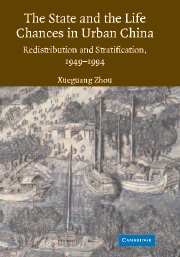Book contents
- Frontmatter
- Contents
- List of Figures
- List of Tables
- Preface
- Credit Line
- 1 Redistribution and Stratification Dynamics Under State Socialism
- 2 Overview: Historical Context and Research Design
- PART ONE REDISTRIBUTION AND STRATIFICATION DYNAMICS: EMPIRICAL EVIDENCE
- PART TWO ASSESSING INSTITUTIONAL CHANGES IN THE POST-MAO ERA
- 7 Economic Transformation and Changes in Income Inequality
- 8 Redistribution and Latent Economic Benefits
- 9 Institutional Changes and Patterns of Job Shifts
- 10 Economic Transformation and Life Chances: A Life-Course Perspective
- PART THREE SUMMARY AND CONCLUSION
- References
- Index
9 - Institutional Changes and Patterns of Job Shifts
Published online by Cambridge University Press: 28 October 2009
- Frontmatter
- Contents
- List of Figures
- List of Tables
- Preface
- Credit Line
- 1 Redistribution and Stratification Dynamics Under State Socialism
- 2 Overview: Historical Context and Research Design
- PART ONE REDISTRIBUTION AND STRATIFICATION DYNAMICS: EMPIRICAL EVIDENCE
- PART TWO ASSESSING INSTITUTIONAL CHANGES IN THE POST-MAO ERA
- 7 Economic Transformation and Changes in Income Inequality
- 8 Redistribution and Latent Economic Benefits
- 9 Institutional Changes and Patterns of Job Shifts
- 10 Economic Transformation and Life Chances: A Life-Course Perspective
- PART THREE SUMMARY AND CONCLUSION
- References
- Index
Summary
Since the 1980s, an increasing number of sociological studies have examined processes and consequences of transitions from state socialism, and the experience of economic reform in China has drawn particular attention. Central to these recent studies are assessments of large-scale institutional transformation and implications of these changes for mechanisms of social stratification. As we noted before, an interesting observation is that most studies in this literature have used determinants of direct economic benefits (e.g., income) to infer changes in institutions and mechanisms of stratification (e.g., Bian and Logan 1996; Nee 1989, 1991, 1996; Peng 1992; Walder 1995a; Zhou 2000a).
There is an implicit assumption behind the almost exclusive focus on personal income. In market societies where resource changes take place in the marketplace, personal income serves as the most important medium for resource acquisition and a good measure of one's economic benefits. Thus, to a large extent the primary focus on personal income to study differences in economic benefits and social status is justified (but see O'Rand 1986). Many studies of the industrialized market societies and analytical models and research designs accumulated in the sociological and economic literature. As sociologists trained in these traditions began to examine social inequality in state socialist societies, there was a natural tendency to adopt similar analytical models and apply similar research experience to study personal income.
- Type
- Chapter
- Information
- The State and Life Chances in Urban ChinaRedistribution and Stratification, 1949–1994, pp. 246 - 271Publisher: Cambridge University PressPrint publication year: 2004

